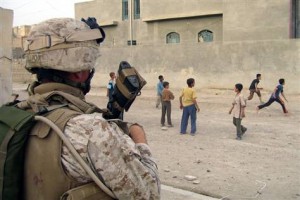PTIR Internship Focuses on Undergrad Research

Hosting a symposium to discuss new research findings is a rather common event for universities today. However, the symposium “Rethinking Insurgency” held at Wesleyan this fall was unique in one important way: the vast bulk of research was done by undergraduates.
Their research was the final product of an intensive 10-week summer internship held under the auspices of Wesleyan’s Program on Terrorism and Insurgency Research (PTIR), which is directed by Assistant Professor of Government Erica Chenoweth. Chenoweth says that undergraduates are often overlooked in many research institutions, but that Wesleyan’s tradition of embracing undergraduates as participants in active research helped create the internship.

“This has long been true in the sciences here so we thought why not formalize a program in the PTIR?” Chenoweth says.
The internship was designed to study the outstanding characteristics of violent insurgencies and nonviolent mass movements. Chenoweth created it to complement her own ongoing research.
“This wasn’t just an exercise. The results would provide real data and trends that speak to issues of national security surrounding terrorism, insurgency and civil resistance,” she says. “It also offered a new kind of learning model that was perfect for a liberal arts institution.”
Chenoweth worked with Emmanuel Kaparakis, director of centers for advanced computing, director of the Quantitative Analysis Center, and Orion Lewis, post-doctoral research associate, to devise a program that would provide participating students with the advanced statistical training they would need to perform effective data gathering and analysis. Ultimately, the internship was structured so that the students could learn and refine quantitative methods in the morning and then focus on data collection and cataloguing.
Seven students enrolled in the program, which provided a stipend for participation. The focus of their data collection and cataloguing included such topics as the frequency of insurgencies in Africa; how media coverage can affect the potential success of an insurgency; and the conditions which often result in crackdowns by authoritarian regimes. The students also gained first-hand experience with research design, data collection, effective quantitative analysis and how to present findings.
“I got very nervous at the start of the internship,” says Yvonne Linn ’13. “I had no prior experience doing independent research and had only a vague idea of how research in the social sciences worked. This summer internship changed my view. It gave me a better sense about the sort of academic studies I want to pursue in the future.”
It also yielded substantial data, which the students analyzed with Chenoweth. The results were written up by the students into briefs, which they presented at the symposium during the fall semester.
The symposium also featured presentations by scholars from across the nation who specialize in civil resistance and violent insurgency. Along with providing a forum for students to share their research and hone their presentation skills, the symposium provided an opportunity for the undergraduates to build relationships within the research community that studies insurgencies.
“The discussion was at a uniformly high level, a standard set by student presentations by Wesleyan undergraduates,” says Jason Lyall, assistant professor in the department of political science, Yale University, and director of Yale’s undergraduate studies the international studies major. “They provided new ideas and insights into the patterns of intra-state violence since 1945.”
Chenoweth hopes to secure further grant funding to make the internship a regular opportunity for interested students. She also sees it as a possible model for other departments.
“This model is ideal for a liberal arts setting. At most research institutions, graduate students often perform the same tasks that our undergraduate students completed,” she says. “Small liberal arts institutions facilitate interaction between faculty and students, but that interaction can be even more beneficial when students engage in educational endeavors that help advance faculty research. The students acquire invaluable experience and researchers end up with a data goldmine. It’s a win-win.”
For more information on the Civil Resistance Project click here.

